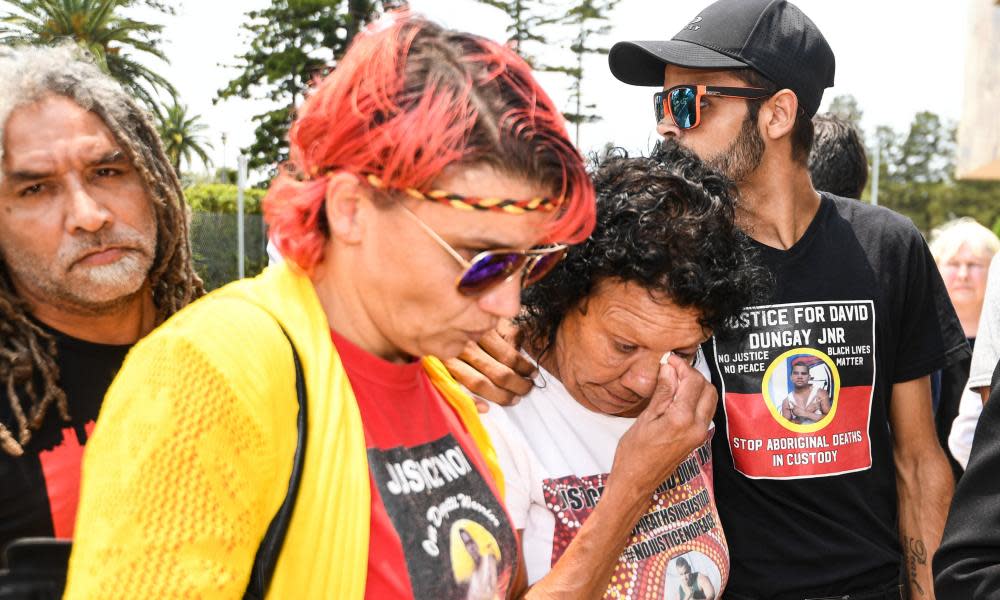Family of David Dungay, who died in custody, express solidarity with family of George Floyd

The family of David Dungay, an Aboriginal man who said “I can’t breathe” 12 times before he died while being restrained by five prison guards, said they have been traumatised anew by footage of the recent deathof an unarmed black man in the US, George Floyd.
Related: George Floyd: protests and unrest coast to coast as US cities impose curfews
Dungay’s family said they want the New South Wales director of public prosecutions to investigate whether charges could be laid against the prison officers involved, and they intend to lodge a complaint against the nursing staff involved in his treatment.
The 26-year-old Dunghutti man, who had diabetes and schizophrenia, was in Long Bay jail hospital in November 2015, when guards stormed his cell after he refused to stop eating a packet of biscuits.
Dungay was dragged to another cell by guards, held face down and injected with a sedative by a Justice Health nurse. In harrowing footage shown to the court and partially released to the public, Dungay said 12 times that he couldn’t breathe, before losing consciousness and dying.
In November last year NSW deputy coroner Derek Lee found “it was neither necessary nor appropriate for David to be moved and that he “did not pose a security risk”.
“From a medical point of view there was no evidence of any acute condition which would have warranted a cell transfer,” Lee said.
However, he said none of the five guards should face disciplinary action. Their conduct, Lee said, “was limited by systemic efficiencies in training” and was “not motivated by malicious intent” but “was a product of misunderstanding”.
But the Dungay family said they will fight for somebody to be made accountable for his death.
“It’s plain and simple, the use of force was a contributing factor to his death,” Dungay’s nephew, Paul Silva, told Guardian Australia. “If you take that use of force out, would David Dungay still be alive today? Yes, he would.”
Related: Deaths inside: every Indigenous death in custody since 2008 tracked – interactive
Silva said he has tried to watch the footage of the death of George Floyd, who died after a police officer knelt on his neck and whose death has sparked furious protests across the US, but had to switch it off halfway.
“When I heard him say ‘I can’t breathe’ for the first time I had to stop it,” Silva said. “My thoughts really go out to the family and everyone on the streets in the USA. My solidarity is with them because I do know the pain they are feeling.”
“And as for the Aboriginal deaths in our backyard … it’s not in the public as much as it should be.
The NSW Safework commission has rejected their request for an investigation. In a letter seen by Guardian Australia, the commission said it did not intend to look further because Corrective Services had conceded it had made “organisational failures” and the coroner had made recommendations for their improvement.
“It’s hard to believe that in modern Australia, some 25 years after the royal commission into Aboriginal deaths in custody, this is still happening without accountability,” the National Justice Project’s George Newhouse said.
“Just this week a woman who was mauled by a lion is now the subject of a full Safework NSW investigation, but Safework NSW has written to David Jr’s mother and told her that they do not propose to undertake an investigation in relation to David Jr’s death.
“Whilst we pray for the welfare of the zookeeper the difference in treatment between her and David Jr is stark and wrong morally and legally. David Jr’s mother Leetona struggles to comprehend it,” Prof Newhouse said.

 Yahoo News
Yahoo News 
